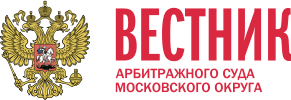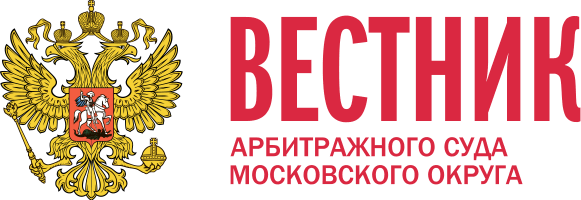This Policy defines the ethical principles that guide the Moscow District Commercial Court Bulletin editorial staff in their work.
Editorial responsibility
The Moscow District Commercial Court Bulletin editorial staff (hereinafter referred to as the editorial staff) follows the ethical principles endorsed by the global research community. In our work, we follow the recommendations of the Committee on Publication Ethics (COPE).
Editorial decisions
The responsibility for selecting the manuscripts to be published lies with the editorial staff. The decision is made based on the Bulletin’s policy, while taking into consideration legal norms on copyright currently in effect and avoiding libel or plagiarism. Editorial assessment of a manuscript is not based on race, ethnicity, gender, religion, citizenship or political views of its author. The decision to publish or not publish a manuscript is made solely on the basis of its scientific importance, originality, clarity of thought and writing and relevance to the Bulletin’s scope of interests.
Confidentiality
All editorial staff bear responsibility for disclosing any information on received manuscripts to third parties who are not the author/authors, reviewers, potential reviewers or publishers.
Conflict of interests
Unpublished data featured in a manuscript cannot be used by the editorial staff to facilitate their own scientific research without written permission by its author/authors.
Plagiarism, data falsification and error correction
In case of an ethics complaint or a conflict situation regarding a manuscript or a published article, editorial staff shall respond with reasonable action, cooperating with the publisher to ensure restoration of the rights violated and facilitating the publication of corrections or rebuttals if errors are discovered. Every report on unethical behavior will be investigated, even when received years after the publication date.
In case of plagiarism or other violations of the ethics policy, the editorial staff may initiate a retraction for the article in question.
Reviewers’ responsibility
Contribution to editorial decision-making
Reviews are introduced to help the editorial staff make publication decisions. They can also help authors to improve their manuscripts.
Promptness
If the reviewer picked by the editorial staff feels unqualified to review the manuscript in question or knows they will not be able to do it by the set deadline, they should promptly notify the editorial staff and recuse themselves from further participation in the reviewing process.
Confidentiality
Any material sent in for review should be treated as confidential and should not be disclosed to or discussed with third parties without prior approval of the editorial staff.
Due impartiality
Reviews shall be conducted in an impartial manner. Personal criticism towards authors is unacceptable. Reviewers should present their opinion clearly and coherently, providing arguments to support it.
Verification of sources
Reviewers are also responsible for determining whether published works relevant to the manuscript in question were not cited in it or not featured in the list of references, as well as whether all statements, conclusions and ideas from other publications have been properly referenced to the source. If a reviewer sees considerable similarity between the manuscript and a published work they are familiar with, they must notify the editorial staff.
Disclosing information and conflict of interests
Information and ideas that are not to be disclosed and were received by reviewers in the course of the review process should be treated as confidential and shall not be used for personal ends. Experts should not review manuscripts that could cause a conflict of interests as the result of competitive, collaborative or other types of relationships between the expert and the author/authors of the manuscript in question or companies and institutions connected to the manuscript.
Authors’ responsibility
Integrity and research standards
If a manuscript is based on original research, its author/authors should present accurate results of their work and unbiased assessment of the importance of their research. The manuscript must contain all the key data, accurate description of the research process and references to ensure reproducibility of results. Falsifying data or intentionally making incorrect claims is considered unethical and unacceptable.
Access to data
The editorial staff may ask authors to provide original data in addition to their manuscript. Authors should be ready to do so, unless it breaches confidentiality of those who took part in the experiment described or the rights of an individual or a company who owns the data.
Originality, plagiarism and references
Authors must submit original work only and provide proper citations and references to the source when mentioning works by other authors. Publications that had a significant impact on the research process or determined its format should also be acknowledged.
Multiple, secondary or competing publications
As a general rule, manuscripts presenting the same research should not be published in more than one journal. Submitting a manuscript to more than one journal is considered unethical and unacceptable. Previously published copyright-protected works must not be submitted to our journal for publication. Moreover, manuscripts under consideration by our journal should not be submitted to other journals for publication as copyrighted work. Submitting their manuscript, authors should inform the editorial staff about any previous submissions that could be considered a duplicate or overlapping publication. Authors should notify their editor if the manuscript contains information published as part of their previous work or submitted to a different journal for publication. In this case the new publication should contain references to the previously published work.
Authorship criteria
Authors are defined as individuals who made substantial contributions to a) the conception and design of the work, as well as the acquisition and interpretation of data for the work; b) drafting the work or revising it critically to improve the content quality; c) final approval of the version to be published. All authors should take part in producing the work to the degree of being held publicly accountable for their part of the work.
Contributors whose role was limited to acquiring funding or collecting materials for the manuscript should not be listed as authors. General supervision of a research group does not qualify an individual for authorship.
All individuals identified as authors should approve the final manuscript and the decision to submit it for publication.
Conflict of interests
To submit their work, all authors should first sign a statement outlining financial or other conflicts of interest that could be considered to have influenced the results of their research or interpretation thereof, indicating all funding sources for their research.
Taking part in review process
Authors should take an active part in the review process by promptly answering questions and correcting their manuscript based on the reviewer’s comments, if necessary.

